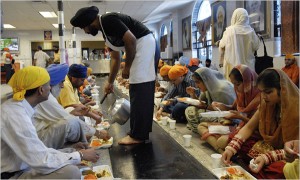
I will write more later. There are reasons to be excited; there are reasons to be cautious. Today I am inspired.
Visit the Sikholars website and choose to register for the entire weekend or just for the conference. There are a number of exciting presentations by leading scholars in the community. Mark down your calendars from February 25-27, 2011 as Sikh professionals, academics, and activists come together in the Bay Area. Hope some of our Langar-ites can also attend!
Malcom X once designated the term ‘house negro’ to describe the African American slaves that were unwilling to leave their marginally comfortable lives subjugated by their white slave owners and very likely to support the oppressive system of slavery. These ‘house negros’ continued to exist throughout history helping perpetuate atrocities against their fellow African Americans, conspiring to no end to keep oppressive systems in place. Nowadays, we have a house Negro as a president, and in Canada, we have house Sikhs.
The last few years have been vital for the right wing in Canada. Canada has taken an unprecedented role in the international stage in upholding oppressive regimes and systems and continuing its role in the war on terror and the war in Afghanistan. Two wars which have produced over a million dead bodies, tens of millions more displaced and dispossessed, and countless lives traumatized. But we all know this; we all have been witness to the horrors of these wars and there’s no need to continue on exploring their horrors, but what is important is to see where our own Sikh leaders have been while millions of innocent lives were destroyed. What we find, surprisingly, is a lack of concern or at the extreme, complicity and support.
Being a Canadian and being sensitive to our communities suffering and that of other communities, I find myself pitted against a majority that is suffering from apathy. I see a Panjabi, Sikh community consistently disenfranchised from Canadian polity yet being consistently utilized as a major voting bank by exploitative politicians who invest in our communities apathetic and introverted nature. They see a community willing to throw support to any tom, dick and harry that greets them with a ‘sat-sri-akal’ and a half assed smile and we all too willingly welcome them in our homes and institutions. This is a narrative we find almost universally everywhere and though it does not necessarily imply a problem relative to only our community, it is a systemic problem that has to be recognized and corrected. But even with these corrective measures, we, in Canada, have begun to see these ‘house Sikhs’ prop up and this is going to be a struggle onto itself.
Kicked off by Tunisia’s Jasmine Revolution last month, the massive uprisings against U.S.-backed authoritarian regimes throughout the Arab world have grown into an undeniable and unprecedented force for real democracy.
democracy.
Since the dictators being targeted have close ties to Washington, the leaders of our government are finding themselves in a rather uncomfortable position. Senator John McCain was a little more blunt than the Obama adminstration when, on Fox News last week, he called the rise of democratic movements a “virus…spreading throughout the Middle East,” referring to this as “the most dangerous period of history…of our entire involvement in the Middle East, at least in modern times.” Obama and Clinton talk a smoother, more diplomatic talk, but the take home message is the same: “Change” in the Middle East must be on our terms.
In a column in the Guardian on Friday, Noam Chomsky wrote, “Washington and its allies keep to the well-established principle that democracy is acceptable only insofar as it conforms to strategic and economic objectives: fine in enemy territory (up to a point), but not in our backyard, please, unless properly tamed.”
Indeed, while the Obama administration pays lip service to supporting “democracy” in Egypt (after backing and funding Mubarak for the last 30 years), it has lined up long-time Mubarak aide Omar Suleiman to lead the so-called transition to a new government. The New Yorker reported that Suleiman “has served for years as the main conduit between the United States and Mubarak… [H]e was the C.I.A.’s point man in Egypt for renditions—the covert program in which the C.I.A. snatched terror suspects from around the world and returned them to Egypt and elsewhere for interrogation, often under brutal circumstances.”
That’s democracy for you, American style.
For Sikhs in the United States today, what does it mean for us to pay taxes to a government that actively works against the freedom, self-determination, and sovereignty of millions of people around the world, including our brothers and sisters in Egypt whose relentless protests have been met with violent, state-sponsored repression?
This is of course a question that I would ask all citizens of the United States, but for us Sikhs, I don’t think it is simply a political question, but also spiritual one.
 Rare are those sevadars that give their entire life to the Qaum. They are our jewels. Earlier this week, we lost one.
Rare are those sevadars that give their entire life to the Qaum. They are our jewels. Earlier this week, we lost one.
Captain Kanwar Harbhajan Singh, popularly known as Papa Ji, was the tour de force behind the International Institute of Gurmat Studies (IIGS). His family, friends, and network taught a generation of Sikhs how to connect with their Guru. They held camps throughout the world – from India, to Punjab, to California, to Canada, and many other countries in between.
He had his detractors; he had his critics. Yet, no one ever questioned his nishkam seva and dedication to his community. He inspired so many and we hope that through them his spirit will live on. A website has gone up allowing people to share their memories. It can be visited here.
It also gives some summary of his incredible journey
With great sorrow in our hearts, we inform you that our dear Papa Ji, Captain Kanwar Harbhajan Singh, has completed his worldly journey. He passed away on January 30, 2011. He will be greatly missed by the entire IGS family around the world. Papa ji dedicated his life to spreading the message of the Gurus, constantly motivating the future generations to maintain their Sikh identity. We will miss him dearly and pray that Waheguru ji give us all the strength to carry on his message.
Click below the fold for information on his bhog and ardas that will be held on February 5, 2011.
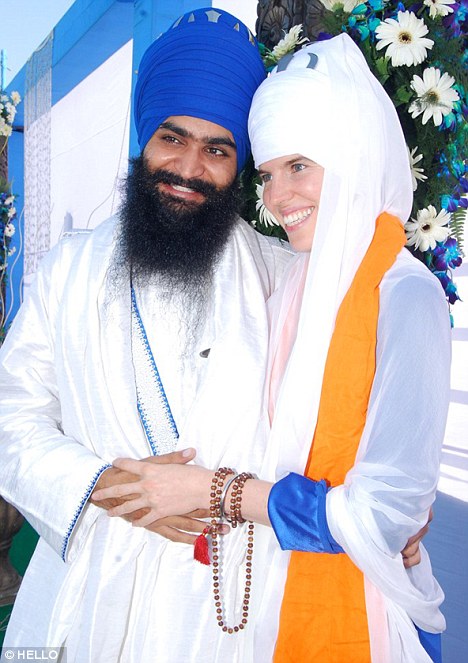 So it is my mother use to tell me. This particular marriage, however, seems to have been made at Darbar Sahib (as close to heaven, as I’ll ever get!). UK’s tabloid press has reported on the wedding of Harvinder Kaur Khalsa (formerly Alexandra Aitken, daughter of disgraced Torty politician Jonathon Aitken) and Inderjot Singh. The picture speaks a thousand words.
So it is my mother use to tell me. This particular marriage, however, seems to have been made at Darbar Sahib (as close to heaven, as I’ll ever get!). UK’s tabloid press has reported on the wedding of Harvinder Kaur Khalsa (formerly Alexandra Aitken, daughter of disgraced Torty politician Jonathon Aitken) and Inderjot Singh. The picture speaks a thousand words.
Just as interesting has been her interest in Sikhi. Below the fold, you’ll find some of her thoughts/observations about her transformation, well worth a read!
Frankly, if someone had told me ten years ago, when I was living the party girl lifestyle in London, that a decade later I’d be a teetotal vegan, I simply wouldn’t have believed them.
If they’d gone on to tell me that I’d also have converted to Sikhism, changed my name to Harvinder Kaur Khalsa and be married to an Indian warrior whom I fell in love with before we even exchanged a single word, I’d have laughed my head off.
After all, I was positively allergic to organised religion. It just seemed so grey to me. But then I don’t really think of Sikhism as a religion, more a path for anyone who is looking for something more spiritual.
While many have heard about SikhRI’s Sidak program, too few have enriched their lives through this unique opportunity to explore and engage with Sikhi. Make this the year you attend – head over to San Antonio from Jun 25 – Jul 9, 2011.
Here is a video promo from last year – mind the date change!. Below the fold, you’ll find some information on the curriculum.
Yes, I am going to indulge in imposing what I believe our priorities are onto those of you reading this. Our priorities should be where the ground touches our feet and not the vast mansions seating established masands who rake in millions and output redundant declarations commemorating our great history year in and year out.
I’ve seen it happen all across the world. I’ve seen individuals and organizations scrambling to raise moneys for the poor widows in Delhi who need justice and security. I then went on to see that those widows still anguished within a glimmer of hope. Exploited, used and molested by westerners, that glimmer of hope will soon fade. Those widows will die, their children already disenfranchised from Sikhi and thrown into the wallows misery, poverty and drug addiction are turning to Christian missionaries for support. All the while, our masands erect massive, superfluous houses to promote Sikhi and create focal points for Sikhs to congregate. Because, that is what should attract Sikhs: massive Gurdwaras and not the love of our Gurus or our need to lay our heads on their laps.
Watching protests erupt all over the Middle East and North Africa gave me hope; if these seemingly apathetic peoples can rise against heavily oppressive systems of governance then we, too, can rise against this unjust use of finances and take our community back and direct it toward a path of Sarbhat da Bhalla.
These are some of the Gurdwaras in question:


A report from the BBC:
http://www.bbc.co.uk/news/11818769
Guest blogged by Navdeep Singh Dhillon
My wife’s family is Hindu, with varying degrees of connections to the religion. Some of them have statues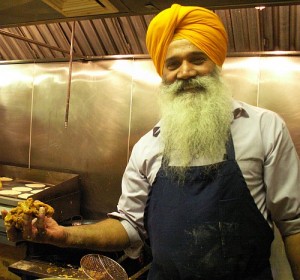 of deities like Krishna and Ganesh scattered throughout the house, others have entire rooms sectioned off for bhajans and pujas, and then there are those, who shall remain nameless, that go on random fasts they can’t explain. “It is a potato diet. I will eat potatoes today. Who else wants aloo parantha and aloo pakodas?” is the only explanation given during fasting for the nine days of Navratri. I still don’t get it. Nor do I get why some Sikhs don’t eat certain foods on Thursdays, or why Jains have such a problem with potatoes because living organisms might be killed, but have no qualms about dousing their bland food with ghee, or eating vast quantities of paneer.
of deities like Krishna and Ganesh scattered throughout the house, others have entire rooms sectioned off for bhajans and pujas, and then there are those, who shall remain nameless, that go on random fasts they can’t explain. “It is a potato diet. I will eat potatoes today. Who else wants aloo parantha and aloo pakodas?” is the only explanation given during fasting for the nine days of Navratri. I still don’t get it. Nor do I get why some Sikhs don’t eat certain foods on Thursdays, or why Jains have such a problem with potatoes because living organisms might be killed, but have no qualms about dousing their bland food with ghee, or eating vast quantities of paneer.
Many of my wife’s family live in a concentrated area in Central Jersey a few minutes from each other. In the neighborhood, there is a Hindu temple, which they visited once, and never returned to. No, not because of politics, or religious differences. The reason: they didn’t like the food. It is a Gujarati Hindu Temple, and they are very Punjabi. So they go out of their way, driving through the most industrial and uninspiring landscape New Jersey has to offer, to eat Punjabi food at the Gurdwara.
The irony is not that they are Hindu and attending a Sikh Gurdwara when a Hindu temple is a few minutes away. Sikhism has, from its inception, been welcoming to all religions, and many of the verses in the Guru Granth Sahib were written by Muslims and Hindus. The four openings at the Harimandir Sahib invite people from all directions and walks of life. The irony is that through their food, which Gujaratis and Punjabis take very seriously, both communities have been the hardest hit by ailments like heart disease and diabetes, affectionately known as “sugar.”
My post is an expansion on Brooklynwala’s post “Working for Langar Justice,” which talks about making the move for our Langar Halls to go organic, a move I highly encourage.
On a recent visit to Amritsar, one of the topics of interest was the newly approved plan by Chief Minister Badal for the revamping of the entrance to the Darbar Sahib. The plan includes a “state-of-art” restructuring of the entrance plaza.
According to one article, the new entrance would address accessibility for pedestrians and eco sustainability. It was also noted in this article that a timeline for completion and budget for this project has not been planned.
While the Panjab government is clearly looking to increase their tourism value, it was made clear to me that many Panjabis are not huge supporters of a project that will change the existing architecture around the Darbar Sahib. There is a strong sentiment that religious buildings should be treated as such, rather than as tourist spots.
The Darbar Sahib complex does rely on funds to ensure sustainability but with plans to enhance the Darbar Sahib with tourism in mind, the Panjab government will be treading a fine line to make sure that the holiest of places for Sikhs does not become impacted by visitors. Nevertheless, the Darbar Sahib is not the first place to be affected by increased tourism. Other “wonders” around the world are also working to address how to balance the sustainability of history with the growing inquisition of visitors.
What do you think? Should the Darbar Sahib be redesigned with tourism in mind or should efforts be made to keep the area intact as an important religious place?
Book your flight, complete your registration, and plan on attending Sikholars 2011 now. This wonderful event will be held at CSU East Bay (Hayward, CA) from February 25-27, 2011. Having attended last year, I can say that this is one of the few forums in the community to engage in critical thought, intellectual stimulation, and meet other like-minded people in the community. The event is geared towards Sikhs, ages 25+.
In addition, this year there will be a number of evening dinners, mixers, and functions to allow young Sikhs to network and make important connections. I will definitely be in attendance and hope many of our TLH readers will be too. Visit the Sikholars website and REGISTER NOW as I have been told there is limited seating and they will fill up (especially by Canadians!).
Vancouver-based hip hop artist Saint Solider and singer Sukhraj recently released a moving single about farmer suicides in Punjab. I won’t editorialize, as the song (and video) speaks for itself. You can download the track on iTunes and by donation at bandcamp.
Since 9/11, Sikh advocates and community members have been proactive about providing training for law enforcement officers to educate them about our religion and articles of faith and to foster positive relations between local police and Sikhs. My feelings about the role of the police in our communities aside, the Village Voice is reporting that New York City cops have been doing some learning about the Muslim community lately. But not the kind of learning that SALDEF and other Sikh organizations have been facilitating across the country.
At a recent counter-terrorism training, NYPD officers were shown a full-length, Muslim-bashing film called The Third Jihad. According to the Village Voice, the film “is 72 minutes of gruesome footage of bombing carnage, frenzied crowds, burning American flags, flaming churches, and seething mullahs. All of this is sandwiched between a collection of somber talking heads informing us that, while we were sleeping, the international Islamist Jihad that wrought these horrors has set up shop here and is quietly going about its deadly business.”
During the film, the narrator says, “Americans are being told that most of the mainstream Muslim groups are moderate when in fact, if you look a little closer, you’ll see a very different reality. One of their primary tactics is deception.”
Guest blogged by Hunny Singh
Recently I went home to the East Coast and had som e inspirational time with my family. While snowy conditions prevailed outside, inside the house, a pizza soon to be shared joined a confused and yet open love for a dance. I had an interaction with my mother that got me wanting to share with y’all. Here’s the story…
e inspirational time with my family. While snowy conditions prevailed outside, inside the house, a pizza soon to be shared joined a confused and yet open love for a dance. I had an interaction with my mother that got me wanting to share with y’all. Here’s the story…
As Ma Ji pokes her head out from behind the curtains, she pauses ever so slightly, and says:
“Remember the Guru with every passing day.”
She returns to being with the Sri Guru Granth Sahib, glasses on, focused gaze settling back in. Especially endearing to me are her engaged brows, lifted eyelashes, and soft thought.
In the dim light, I see the reflections of the Guru’s words bringing meaning upon her eyes.
Yup, I’ve seen that look before so many times.
She is in Baba Ji’s room.
I don’t remember when the Baba Ji’s* room became a part of our house and our lives, but I do remember it always being there. That’s the only name I have ever known for the room. I think this room is something that many Sikh folks share, in some way or form–a special intimate space.
Today marks the 82nd birthday of Reverend Dr. Martin Luther King, Jr. Most of us learn about Dr. King’s influential role in the Black Civil Rights Movement in the United States, and have heard his “I have a dream” speech. But less do we hear about his opposition to the Vietnam War and his revolutionary calls for an end to U.S. militarism, calling his government “the greatest purveyor of violence in the world today.” As a man who was deeply driven by spiritual motives who used religious institutions to organize millions, Dr. King is a constant inspiration to me, and I hope to other Sikhs.
Check out the below video to hear his powerful and righteous “Beyond Vietnam” speech from April 4, 1967, exactly one year before he was murdered.
I am convinced that if we are to get on the right side of the world revolution, we as a nation must undergo a radical revolution of values. We must rapidly begin…the shift from a thing-oriented society to a person-oriented society. When machines and computers, profit motives and property rights, are considered more important than people, the giant triplets of racism, extreme materialism, and militarism are incapable of being conquered.
I love food. I love to cook. I love to gather with friends, community, and sangat and share a meal together.
Because food it our most primal need and our common bond to the earth and one another, it can ground us as we stretch ourselves to draw in all the interlaced threads—so we can weave a whole, meaningful picture for ourselves. I still believe food has this unique power. With food as our starting point, we can choose to meet people and to encounter events so powerful that they jar us out of our ordinary way of seeing the world, and open us to new, uplifting, and empowering possibilities. – Frances Moore Lappe and Anna Lappe, from Hopes Edge: The Next Diet for a Small Planet
The Sikh institution of langar has always been something near and dear to me, partially because of my borderline obsession with food, but also because it really gets to the heart of Sikhi. The practice of langar, our free community kitchen, was started some 500 years ago by Guru Nanak to meet a basic human need – eating – and to create a space for community-building that reflected the Guru’s radical vision of equality. Rules about food preparation and eating were (and still are) one of the central ways that caste oppression was enforced. Langar turned this all on its head. With everyone sitting together on the same level (on the floor) and eating the same simple food, which was prepared by people from all caste backgrounds, langar was nothing short of a revolutionary accomplishment.
It is with this lens that I want to discuss the food of langar itself.
Guest blogged by Navdeep Singh Dhillon
The reformist, humanitarian wife of Franklin D. Roosevelt (32nd President of the United States) – and “first lady of the world” – Eleanor Roosevelt once famously said, “Great minds discuss ideas, average minds discuss events, small minds discuss people.”
Over the past few years, I have become quite disheartened over the state of the discussion of 1984, based on conversations I’ve had with seemingly well-educated people and what I’ve seen in the media. The record seems to be stuck on “events” and has barely moved an inch into the arena of “ideas.”
A few months ago, an entire issue of India Abroad was devoted to 1984 and I was initially interested to read it. But after reading just a few paragraphs, I realized it was the same ole, same ole: a recap of the events by people who were narrating their experiences during 1984 and shortly thereafter. The experiences themselves were very vividly told, but the articles didn’t seem to have any real purpose, other than to keep the conversation within 1984.
It is obviously extremely important to know the facts, the history, the events that took place, the backdrop, and of course the people involved. But there should be a “now what?” aspect put into place that involves something more than mentioning the names of Jagdish Tytler and Sajjan Kumar, rehashing the timeline, the people involved, holding a few film screenings and handing out fliers. Shouldn’t there?
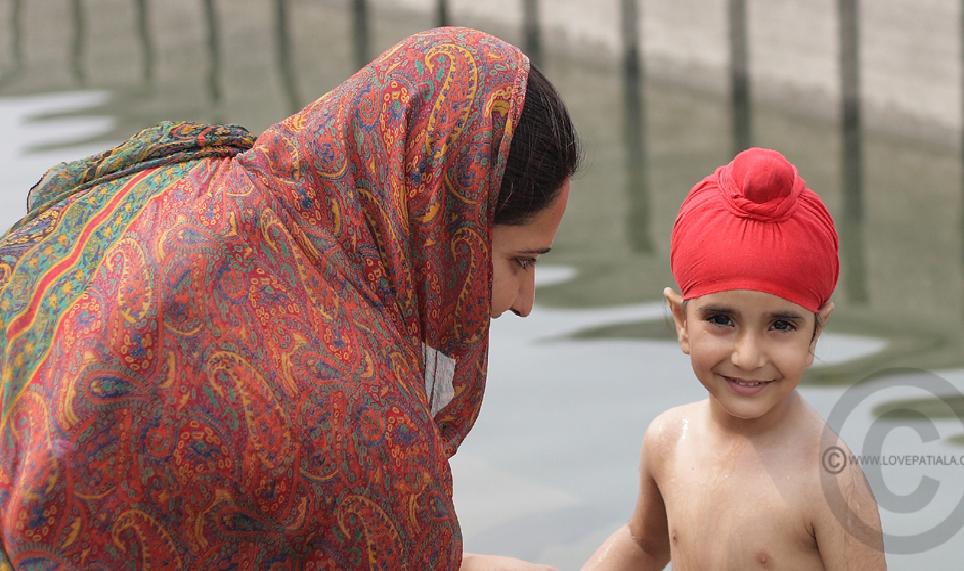 There was an interesting whimsical read in the Wall Street Journal by a Yale Law Professor, titled “Why Chinese Mothers Are Superior” The article states that the ethnicity has some possible substitutions, so I indulged, as its main opposition is suppose to be something called “Western.”
There was an interesting whimsical read in the Wall Street Journal by a Yale Law Professor, titled “Why Chinese Mothers Are Superior” The article states that the ethnicity has some possible substitutions, so I indulged, as its main opposition is suppose to be something called “Western.”
Here are some of its insights:
A lot of people wonder how Chinese parents raise such stereotypically successful kids. They wonder what these parents do to produce so many math whizzes and music prodigies, what it’s like inside the family, and whether they could do it too. Well, I can tell them, because I’ve done it. Here are some things my daughters, Sophia and Louisa, were never allowed to do:
- attend a sleepover
- have a playdate
- be in a school play
- complain about not being in a school play
- watch TV or play computer games
- choose their own extracurricular activities
- get any grade less than an A
- not be the No. 1 student in every subject except gym and drama
- play any instrument other than the piano or violin
- not play the piano or violin.
For more discussion, click below the fold
Guest blogged by Ajaib Kaur
Amrita (Ami) Kaur Dang’s sound often is described as a “blend” of the classical (traditional) and the experimental (non-traditional). Tossing together her North Indian vocal training with impressive sitar skills, she playfully builds collages of inquiry. Also creating the feel of a fireside gathering for trans-national, digital, post-modern sound to question everything. While a blend or an intersection might be an easier way to describe Amrita’s style to a western audience, I find her sound to be an embodiment of the everyday Sikh experience.
Click here to listen to her track “Strange Community.”
The mesmerizing loops and samples, of each track on Amrita’s full length debut album “Hukam” capture the repetitive daily dance we each participate in. Within each track there are varying sensibilities of bargaining, or even resignation, but often vigor and passion that all listeners can relate to.
Guest blogged by Navdeep Singh Dhillon
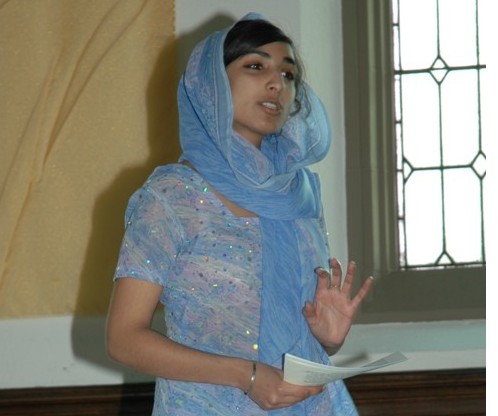 For my first post as a guest blogger, I wanted to address an issue that has been irritating me since September, when I first read about it. [An anonymous] Mehmaan wrote a post titled “Valarie Kaur, the peddler of self-promotion.” Mehmaan’s claim is essentially that Valarie Kaur is a big pakhandi.
For my first post as a guest blogger, I wanted to address an issue that has been irritating me since September, when I first read about it. [An anonymous] Mehmaan wrote a post titled “Valarie Kaur, the peddler of self-promotion.” Mehmaan’s claim is essentially that Valarie Kaur is a big pakhandi.
Mehmaan’s singular criterion for reaching the conclusion that Valarie Kaur is not just a pakhandi, but a big pakhandi, is that she is using social media and her website to promote herself as a speaker and to sell her documentary, “Divided We Fall,” inaccurately called a “movie” in the post.
I have never met Valarie and don’t know her family, but do want to clarify Valarie Kaur’s achievement, relegated to the realm of frivolity with the express purpose of making money, by Mehmaan in order to prove a point.
On September 11, the mood against anyone brown, especially Sikhs, changed drastically, and it culminated with the murder of Balbir Singh Sodhi on September 15. At that time, there was no Twitter. There was no Facebook. Even text messaging wasn’t normal everyday behavior. So there was no immediacy with information. I remember receiving emails through newsgroups I happened to be a part of documenting the steadily rising violence and blatant racism towards brown people. And then switching on my television to see zero updates on the “backlash.” Instead, it was just the same devastating image of planes crashing into the Twin Towers, followed by a turbaned and bearded Bin Laden. So what Valarie Kaur did at 20-years-old is nothing short of phenomenal. Along with her cousin, she went to document the brown experience on a cross-country trip, armed with plenty of panache, zero technical skills and a video camera. The fact is that there is no other documentary, which I am aware of, that weaves such a powerful narrative, intermingling a compelling personal story, and creating the link between not only Sikhs, but anyone of color, including the Japanese-American survivors of camps in the United States.

